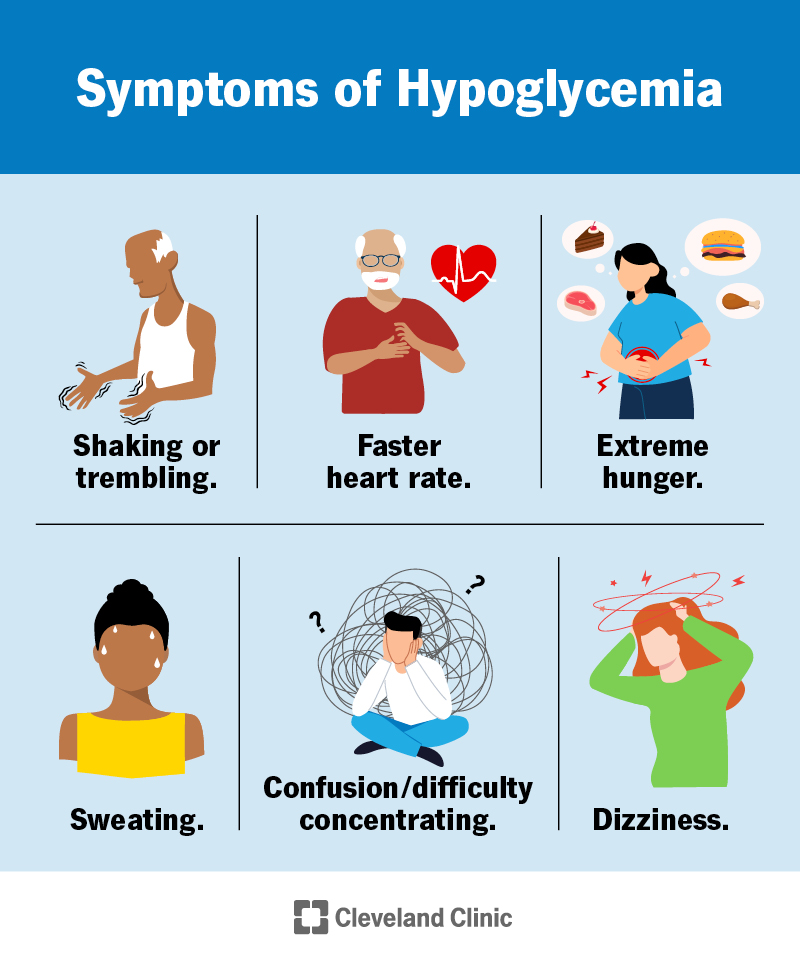|
Symptoms and Causes What are the signs and symptoms of hypoglycemia (low blood sugar)? Symptoms of hypoglycemia can start quickly, and they can vary from person to person. One person can also experience different symptoms for each episode. The signs of hypoglycemia are unpleasant. But they provide good warnings that you should take action before your blood sugar drops more. The signs include: Signs of severe hypoglycemia include: Severe hypoglycemia is life-threatening. It needs immediate medical treatment. In rare cases, severe hypoglycemia that isn’t treated can result in a coma and/or death. You can also experience low blood sugar while sleeping (nocturnal hypoglycemia). Symptoms may include: Restless sleep. Sweating through your pajamas or sheets. Crying out during sleep. Having nightmares. Feeling tired, disoriented or confused after waking up. When do hypoglycemia symptoms appear?The glucose level at which symptoms begin varies from person to person for people who have diabetes. In general, symptoms often begin for people with diabetes when their blood glucose is around 70 mg/dL or lower. If your blood sugar is falling rapidly, you may experience symptoms before this point. Some people with diabetes can have symptoms of hypoglycemia at relatively higher glucose levels. This is because, when you have chronic hyperglycemia (high blood sugar), your body gets used to that as its “normal” level. It alters the set point at which low blood sugar symptoms become apparent. Advertisement Some people who have low blood sugar episodes don’t have symptoms or don’t notice them. Healthcare providers call this hypoglycemia unawareness. People with hypoglycemia unawareness are more likely to have severe episodes and need medical help. Hypoglycemia unawareness can happen in people with diabetes who live with chronically low blood sugar levels. Their body stops having symptoms when low blood sugar occurs. If you have hypoglycemia unawareness, it’s important to let your friends and family know so that they know how to help you if you experience a severe low blood sugar episode. You may also benefit from the following: What are the complications of low blood sugar?Prolonged severe hypoglycemia is life-threatening and can lead to the following complications: Operating heavy equipment, such as driving a vehicle, while having low blood sugar can also be dangerous. You may be more likely to get in an accident. If you have diabetes, always make sure your blood sugar is in range before operating heavy equipment. Advertisement What causes hypoglycemia (low blood sugar) in people with diabetes?Hypoglycemia happens when your blood sugar drops below a healthy range. Several factors can contribute to this for people with diabetes. Hypoglycemia can develop if things like food, exercise and diabetes medications are out of balance. Common situations that can lead to hypoglycemia for people with diabetes include: Taking too much insulin, the wrong insulin or injecting it into your muscle instead of in your fat tissue. Not timing insulin and carb intake correctly (for example, waiting too long to eat a meal after taking insulin for the meal). Taking too much or too high of a dose of oral diabetes medications. Being more active than usual. Drinking alcohol without eating. Eating meals later than usual or skipping meals. Not balancing meals by including fat, protein and fiber. If you’re pregnant and have Type 1 diabetes, you’re also more likely to experience low blood sugar during the first trimester due to hormone changes. What causes hypoglycemia in people without diabetes?There are two main types of non-diabetes-related hypoglycemia: reactive hypoglycemia and fasting hypoglycemia. Reactive hypoglycemiaReactive hypoglycemia happens when you experience low blood sugar after a meal. It typically occurs about two to four hours after a meal. Researchers don’t yet know the exact cause. But they think it happens due to a sudden spike and then fall in blood sugar after eating certain foods, especially simple carbohydrate foods like white rice, potatoes, white bread, cake and pastries. Advertisement Bariatric surgery can also result in reactive hypoglycemia. After certain types of bariatric surgery, such as gastric bypass surgery, your body absorbs sugars very quickly, which stimulates excess insulin production. This can then cause hypoglycemia. Your body usually corrects reactive hypoglycemia on its own, but consuming carbohydrates may help your symptoms go away more quickly. Fasting hypoglycemiaFor the majority of people without diabetes, not eating food for a long time (fasting) doesn’t lead to hypoglycemia. This is because your body uses hormones and stored glucose to manage your blood sugar. However, certain conditions and situations can lead to fasting hypoglycemia in people without diabetes, including: In rare cases, non-diabetes-related medications can lead to hypoglycemia, such as beta-blockers and certain antibiotics. If you’re experiencing hypoglycemia and don’t have diabetes, talk to your healthcare provider. (责任编辑:) |

